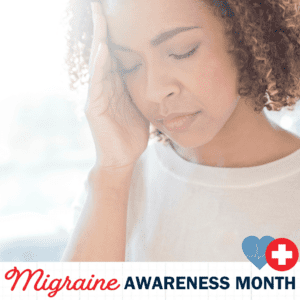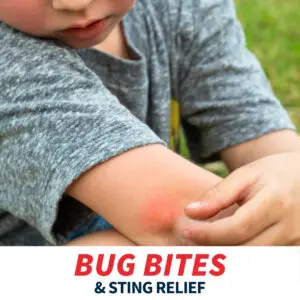Headache & Migraine Awareness Month
 Many people have experienced some form of a headache at least once in their lives, but it can usually be resolved easily with some pain medication and its back to their day. However, for roughly 50% of the global population, recurrent headaches caused by a headache disorder are the norm. These disorders can have people feeling pain for upwards of 15 days every month from migraines, tension headaches, or cluster headaches. This Headache & Migraine Awareness Month (MHAM), started by the Coalition for Headache and Migraine Patients (CHAMP), we hope to bring more attention to these disorders as they pose an incredible burden to those affected.
Many people have experienced some form of a headache at least once in their lives, but it can usually be resolved easily with some pain medication and its back to their day. However, for roughly 50% of the global population, recurrent headaches caused by a headache disorder are the norm. These disorders can have people feeling pain for upwards of 15 days every month from migraines, tension headaches, or cluster headaches. This Headache & Migraine Awareness Month (MHAM), started by the Coalition for Headache and Migraine Patients (CHAMP), we hope to bring more attention to these disorders as they pose an incredible burden to those affected.
What are Headache Disorders?
A headache disorder is primarily defined as recurrent headache. According to the World Health Organization (WHO), these disorders are further categorized into different types that affect people in different ways:
- Migraine: More commonly experienced in women, migraines tend to begin at puberty and mostly affects those between ages 35 – 45 years old. Essentially, a mechanism deep within the brain is activated, releasing pain-producing substances around the nerves and blood vessels within the head. When experienced, people usually have a moderate to severe headache, often on one side that feels like it is pulsating. The headache is usually aggravated by any routine physical activity and can last from a few hours to up to 3 days. Some also experience nausea and sensitivity to light and sound. Migraine sufferers may have one a year or have them as often as once a week.
- Tension-Type Headache (TTH): TTH is considered to be the most common primary headache disorder. Over 70% of individuals report episodic TTH (fewer than 15 days per month), while roughly 1-3% of adults report chronic TTH (more than 15 days per month). Often beginning during teenage years, women are more likely to experience these headaches than men, which are thought to be stress-related or associated with musculoskeletal problems in the neck. These headaches often feel like pressure or tightness, described as a band around the head that spreads into or from the neck. Episodic TTH attacks can last a few hours but hang around for several days, while chronic TTH tends to stay around almost constantly, becoming a more disabling condition.
- Cluster Headache (CH): Affecting men more than women, fewer than 1 in 1000 adults are affected with CH. This disorder is usually developed in individuals in their 20s or older. CH sufferers experience frequent brief but extremely severe headaches up to several times a day. The pain is usually focused in or around one eye, with tearing and redness of the eye. The nose may run or become blocked on the affected side and some may experience eyelid drooping.
- Medication-Overuse Headache (MOH): When we have a headache, it’s common to reach for the medication, but MOH can be caused by chronic or excessive use of these medications. Up to 5% of the world’s population – mostly women – are affected, and the pain is present on most days, can be debilitating, and feels worse when waking first thing in the morning.
Treatments for these headache disorders vary based on the individual, and can include everything from medication to lifestyle changes, medical devices, and more.
Special Awareness Days
Not only is the entire month of June dedicated to bringing awareness to headache disorders, but some specific days are being used to highlight the various challenges and difficulties sufferers face.
- June 1 – Migraine at Work: Show your support from your office – whether at home or on-location – by wearing the official MHAM color: purple.
- June 6 – Veterans With Headache Diseases: As the 76th anniversary of D-Day, MHAM brings to light the fact that, according to the Department of Veterans Affairs, veterans are more likely to develop migraine and headache diseases. While the exact cause is unknown, some researchers believe these are a direct result of military service experience.
- June 7 – Remembrance Day: Honoring Melissa Dwyer who died by suicide in 2013 at just 22 years old because of her suffering from a headache disorder. This day serves to remember her and others who have also tragically passed due to their headache, migraine, or cluster disease.
- June 20 – Headache Diseases and Men: Headaches aren’t exclusive to one gender. To coincide with Father’s Day, this day serves to bring awareness to the roughly 6-8% of men living with migraine.
- June 21 – Shades for Migraine: The Association of Migraine Disorders hosts this promotional event by asking individuals to show support by wearing a pair of sunglasses and posting to social media with the hashtag #ShadesForMigraine, and challenging 3 others to do the same, helping spread the word. The Association also offers fun social media graphics you can share to help you can download for free.
- June 29 – Chronic Migraine Awareness Day: Sponsored by Chronic Migraine Awareness, show your support by wearing red and purple and spreading the word on social media using the hashtag #RallyAgainstChronicMigraine.
Get Help for Headaches & Migraines
If headaches and migraines seem as though they have become a regular part of your life, you may be suffering from a headache disorder. Don’t suffer through them alone; get the help you need to start experiencing a more pain-free life. At Midwest Express Clinic, we can help determine what type of headache you are experiencing and recommend a proper treatment plan. Take this Headache & Migraine Awareness Month as an opportunity to put your health first. Visit any of our convenient area locations today.




